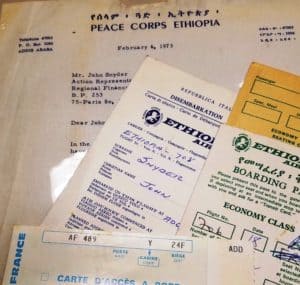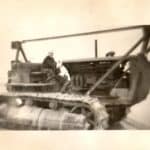Six Timeless Lessons
His list was already long when the time came for my father to shuffle off this mortal coil. WWII veteran. Congressional candidate at age 90. Two-time Indiana state treasurer. Three-time recipient of the Governor’s Sagamore of the Wabash state service award (conferred by three different governors, including one Democrat). Record holder for securing most cross-over statewide votes (many Democrats liked this reasonable Republican and he liked them back). Successful businessman, farmer, God-fearer and family man, the latter two being first in everything.

These would have been plenty for most people. There are some back stories. Since today, December 27, would have been his 98th birthday, allow me to relate a few points from the life of John K. Snyder that might prove of value.
Provide Public Service with Honor
After I graduated from high school in 1972, I found myself in Paris, France, where my father had taken a position at the U.S. Embassy in financial affairs. I would (foolishly) leave by the end of the summer, but he stayed for several more months. Among other duties at the Embassy, he was deeply involved in revamping support and financial stipends for Peace Corp volunteers serving in parts of Europe and Africa.
While there, violence broke out in Uganda. Then-Ugandan President Idi Amin issued an edict that all British nationals had to leave the country or face the consequences. Unfortunately, the Ugandan military and law enforcement officials didn’t totally differentiate who was a British national and who was an American Peace Corps volunteer. Word came down from on high: evacuate the U.S. volunteers immediately.
Unfortunately, Ugandan officials started dragging out the process, even halting it. With little fanfare, my father was sent to Addis Abba in Ethiopia to set up an operation to evacuate the volunteers, whose lives were increasingly endangered.
Finally, he ended up being personally sent to Uganda, armed only with a suitcase full of American cash. There, over a period of several trips, he quietly arranged for each volunteer to leave Uganda safely.
At the time, we knew little of it. Years later, when watching a documentary about the Israeli rescue at Entebbe Airport in Uganda, my father casually remarked, “Oh, I’ve been there, I know that airport.” “What?!” we asked incredulously. He would respond with only the briefest of outlines.
A few months after his death in June this year, I was going through an old briefcase that he carried in those days. My father, a Great Depression-era pack rat, never threw anything away (“Use it up, wear it out, make it do, or do without,” he would often say when I was growing up, enthusiastically quoting my Grandmother Snyder).
In the briefcase were old airline stubs from Ethiopian Airlines and Air France from this 1972-73 Ugandan adventure. But more importantly, there was letter after letter officially thanking my father for his extraordinary service during what was ubiquitously described as “the Ugandan difficulties.”
My father never thought to frame those letters and display them publicly. “Public service is an honor,” he would say.
Creating Opportunity
Shortly after being honorably discharged from the U.S. Navy in World War II, my father came home to a wife and very young son. He briefly attended Purdue University, but postponed his college education to support his young family. He landed a job as a salesman for an Indianapolis school supply company. Within a short time, his outgoing personality, honest dealings and climbing sales figures earned him attention from the higher ups.
Called into the president’s office, he was told he was being promoted and given an exciting new sales assignment. Thrilled, my then-twenty-something father asked what area he would be taking over.
“Everything south of U.S. 40,” he was told with great fanfare. Suddenly crestfallen, my father knew that nothing existed in the way of established business in southern Indiana (U.S. 40 roughly parallels Interstate 70 today, which basically divides the state in two). He protested a bit, noting that there were no sales accounts in that vast area south of Indianapolis. “That’s why it’s so exciting,” was the firm answer.
So, my father, my mother and my older brother and sister dutifully moved to Jasper, Indiana, and later to the city of Washington, some 37 miles to the northwest. (My father would ultimately have a total of six offspring — three brothers and three sisters, plus a multitude of grand- and great-grand children — during his life).
The days turned to months, then to years, as my father crisscrossed southern Indiana on sales calls to area schools. He scored numerous new accounts and made many new friends and business associates. He was well-liked and respected, and became known as a person who could be trusted and one who would exceed expectations. Through hard and tireless work, His personal brand grew exponentially.
Why is this important? Over time, the purchasing agents he dealt with became county auditors. The vice principals became principals, senior administrators and superintendents. The local school boards members became mayors and members of the Indiana General Assembly.
When my father decided to run for state office, hundreds of influential people across the state of Indiana already knew who he was. He had a built-in constituency.
A life-long coin collector (and natural savvy PR pro), he decided to pay his state filing fee for state treasurer in U.S. silver dollars. The resultant photo of him with stacked-up Morgan series U.S. silver dollars was widely circulated by the Associated Press, UPI and the Indianapolis Star. Overnight he was a recognized state figure. And he hadn’t spent a dime in advertising.
The point? He created opportunity where others would have seen little or nothing.
Champion those in need
During the Great Depression, my father had difficulty in collecting his weekly payments for his newspaper delivery route. Although he faithfully delivered the Indianapolis Star every morning, people started to stiff him payment. He had to make up the difference from his own pocket. In those days, that was tough.
Meanwhile, my Grandfather Albert Snyder was the Clerk of the Indiana General Assembly and a successful businessman in the publishing industry. He was well known in my father’s Indianapolis neighborhood.
One day, when my father set out for his weekly collection, my grandfather laid his hand on my father’s shoulder. “I think I’ll walk along with you,” he said.
When needed, my grandfather could serve up a severe look that could stop a clock.
For some reason, the collections that day went much smoother than previously. In the few times where someone refused to pay, my grandfather cheerfully noted that he would personally be by in the next day or so to collect.
My father quickly figured out why things were looking up and tried to thank my grandfather. My grandfather simply told him to “always champion those in need.” He never forgot that, especially in public service.
Avoid a state of “nekultury”
In 1969, we were stuck in Moscow. My father had booked a Russian tour in preparation for a possible run for the U.S. Senate. He wanted to see up close the then-Soviet Union and the Eastern Bloc nations. He took me and my younger brother along. And unexpectedly, we were suddenly stuck in a hotel across from the Kremlin. “No flights to Kiev,” we were told.
Another Indiana state official had also come along on our trip. He wasn’t accepting any excuses. Red-faced and in a loud voice, he all but openly cursed the Russian woman travel official who held our passports, and our way out.
Finally, he gave up. My father said, “let me try.”
Quietly seating himself at the agent’s desk, my father gently apologized, noting that the agent probably had plenty of experience dealing with pushy foreigners. He then produced a ball point pen (a then-prize for Russians) and asked if she would care to have a memento. Her faced softened.
My father asked if she had any children. “Da,” she replied. And on it went.
Within a few minutes, the agent held up a finger. “Allow me to make a phone call,” she volunteered, although my father had asked for nothing. Replacing the handset a few minutes later, she said “There are four seats available to Kiev this afternoon.”
My father thanked her and began to rise. She leaned forward and whispered, “Your friend is nekultury [barbaric, uncivilized]. You are different. Thank you.”
The lesson from my father? With people, a kind approach trumps a full-out offensive any time.
Render honor and respect, even when you don’t understand
During my senior year in high school in 1972, my father and I were driving together. “What are listening to these days?” he innocently asked, knowing that I was a fan of classical music. To my horror, he pushed in an eight-track tape that I had deliberately dis-engaged. It was from the 1969 Woodstock sound track. Instantly, the discordant notes of Jimi Hendrix free-forming the Star-Spangled Banner blasted on in full force.

My father, a World War II veteran, was not amused. He silently rolled down the window (power windows were a luxury in those days) and the Woodstock tape got a free flying lesson.
He just looked at me in great disappointment. Until I read accounts of what it was like in World War II (my father, although in the Navy, served in combat zones in the European Theater), I didn’t have a full appreciation of why my father – a full-fledged member of the Greatest Generation – might have had that reaction.
The point? Be careful to render honor and respect. It’s the basis for civility.
Civilization is a thin veneer
While growing in a small town in southern Indiana, we frequently made trips to Indianapolis, Chicago, Washington, D.C. and elsewhere. I heard my father speak before groups literally thousands of times. I used to joke that I had been to all 92 Indiana county fairs in a clip-on tie, wearing dusty wingtips. Sometimes I would be stuck in smoke-filled rooms, where language got coarse and tempers flared. Sometimes I would be virtually imprisoned in a car when the windows rolled up and four men chain-smoking, all furiously debating the issues of the day. My siblings experienced much of the same thing (if not more).
But through it all, despite the shouting, the frequent “colorful metaphors” and the push-and-pull of politics writ large, my father would always come back and tell me, “Michael if you don’t remember anything else I say, remember this: ‘civilization is a thin veneer.’”
His point? Real civilization –where one can argue passionately and relentlessly about a major issue and then walk out and enjoy a sit-down meal with one’s opponent of just-minutes-ago—is something that has to be continuously built-up and preserved. Civilization, he said, was difficult to construct, but easily destroyed. In the years and days before his death this past June, my father was appalled at the state of 24-hour toxic political outrage that he saw his beloved country falling into.
Ironically, my father died on my birthday. As long as I live, whenever I celebrate my birthday, I’ll be reminded of him, who he was, and what he did.
So today, on his 98th birthday (on the day that he always chuckled that he never got any presents), perhaps we can ponder a few things: opportunity sometimes appears in disguise, that we should never be barbaric (“nekultury”), honor represents a critical virtue, and that civilization requires active nurturing and focused protection.
Happy birthday, Dad.
Michael Snyder is managing principal of MEK, a marketing, PR and digital consultancy firm in Indianapolis, Indiana. Fortuna favet fortibus.
One thought on “Six Timeless Lessons”
Comments are closed.

Excellent work Mike!